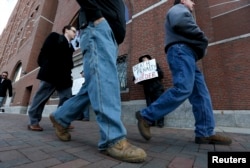Dzhokhar Tsarnaev was convicted on all counts Wednesday in the 2013 Boston Marathon bombings by a federal jury that now must decide whether the 21-year-old former college student should be executed.
Jurors spent slightly more than 11 hours deciding Tsarnaev's guilt in two days of deliberations after 16 days of testimony.
"It's not something that will ever be over," said Karen Brassard, whose ankles and shin were injured by pieces of the bomb. "You'll feel it forever. It's forever a part of our life. ... I don't know what justice is. I'm grateful to have him off the street.''
Two shrapnel-packed pressure-cooker bombs exploded near the marathon finish line on April 15, 2013, killing three people – Martin Richard, 8, Chinese student Lingzi Lu, 23, and Krystle Campbell, 29 – and wounding more than 260 others.
Tsarnaev also was convicted in the death of Sean Collier, a Massachusetts Institute of Technology patrol officer shot to death three days later as he and his older brother, Tamerlan, attempted to evade police.
The defendant, dressed in a blue sweater and dark blazer, looked pale as he entered the courtroom to hear the verdict. His lawyer, Judy Clarke, gave him a brief pat on the back as he sat down.
VOA's Fatima Tlisova reported Tsarnaev folded his arms, fidgeted and looked down at the defense table as he listened to one guilty verdict after another on all 30 counts against him, including conspiracy, murder and use of a weapon of mass destruction.
There were some families of victims in the courtroom, and their reaction as the verdict was read was very calm, Tlisova observed. She noted, though, they seemed satisfied with the verdict judging by discussions she had with them outside the courthouse.
Seventeen of the counts are capital offenses, making him eligible for the death penalty.
“I hope today’s verdict provides a small amount of closure for the survivors, families, and all impacted by the violent and tragic events surrounding the 2013 Boston Marathon,” Boston Mayor Martin J. Walsh said in a statement. “The incidents of those days have forever left a mark on our city.”
Penalty phase
During the penalty phase, which could begin as early as Monday, Tsarnaev's lawyers will present so-called mitigating evidence they hope will save his life.
That could include evidence about his family, his relationship with his brother, and his childhood in the former Soviet republic of Kyrgyzstan and later in the volatile Dagestan region of Russia.
Tsarnaev's conviction was practically a foregone conclusion: His lawyers admitted he participated in the bombings.
But in a bid to save Tsarnaev from a death sentence, defense attorney Clarke argued that Tsarnaev, then 19, fell under the influence of his radicalized older brother. Tamerlan Tsarnaev, 26, died when he was shot by police and run over by his brother during a chaotic getaway attempt days after the bombing.
"If not for Tamerlan, it [the bombing] would not have happened," Clarke told the jury during closing arguments.
Prosecutors laid out evidence that the defendant, an ethnic Chechen who emigrated from Russia a decade before the attack, had read and listened to jihadist materials, and wrote a note in the boat where he was found hiding suggesting the bombing was an act of retribution for U.S. military campaigns in Muslim-dominated countries.
Jurors' questions
Earlier Wednesday, the jury asked U.S. District Judge George O'Toole to clarify two legal terms.
They asked about the term "conspiracy," which appears in several of the charges. O'Toole explained it applied to a plot between Dzhokhar and Tamerlan Tsarnaev that existed from February through April 19 of 2013, when the younger brother was caught.
Jurors also asked if "aiding and abetting," which also appears in several charges, were separate ideas. The judge said the terms represent a single concept.
Massachusetts has not executed anyone since 1947, and Roman Catholic bishops in the state reiterated their opposition to the death penalty on Monday, when the first phase of the trial wrapped up.
VOA's Fatima Tlisova contributed to this report from Boston, and some material for this report came from Reuters, AFP and AP.






